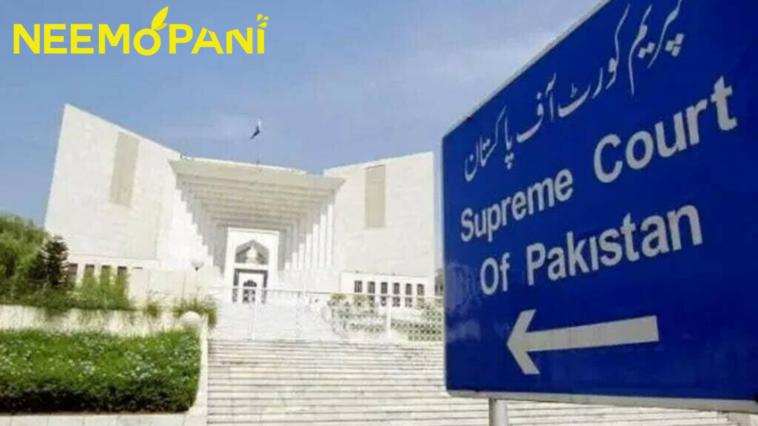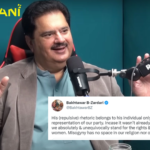The Supreme Court three-member panel unanimously deemed the Election Commission of Pakistan’s (ECP) decision to postpone the Punjab and Khyber Pakhtunkhwa election “unconstitutional”.
Chief Justice of Pakistan (CJP) Umar Ata Bandial, Justice Munib Akhtar, and Justice Ijaz Ul Ahsan directed the electoral authority to conduct a provincial election on May 14.
Due to a rise in terror threats, a security shortfall, and an extraordinary economic situation, the ECP postponed the Punjab election from April 30 to October 8.
Pakistan Tehreek-e-Insaf (PTI) appealed the ECP’s ruling. The highest court accepted the plea on March 27 and conducted six sessions over eight days in which parties submitted their reasons.
Since then, Prime Minister Shehbaz Sharif-led coalition government and Imran Khan-led government have engaged in rhetorical battles, with the former expressing no confidence in the three-member panel hearing the case.
Historic choice
Pakistan’s Supreme Court made history. I suppose Judge Bandial opted to live like [former CJP Justice Alvin Robert] Cornelius, known for his impartiality, rather than Justice Muhammad Munir, who in a famous 1954 opinion authorised the extra-constitutional exercise of emergency powers by then-Governor General Ghulam Mohammad.
Pakistan’s court has finally abandoned the idea of necessity. This is a great constitutional ruling anyway.
The supreme court upheld the constitution, as required by the constitution, and the election commission was downsized for exercising power it did not have and was unconstitutional.
Barrister Muhammad Ahmed Pansota
‘Not initial impression’
This case was not novel or difficult. Because the state failed to hold elections within 90 days, the ruling today is a straightforward interpretation of our Constitution.
The fact that the Supreme Court is single-handedly preserving democracy shows our recent decline. The ruling must be enforced.
Barrister Asad Rahim Khan
SC order “not from any wants”
After 75 years, the Constitution’s importance in state governance is still underappreciated.
Unfortunately, political parties in Pakistan have frequently arisen from military interventions, dictatorships, and martial laws, hindering democratic institutions. So, the institutions and governments that have stifled democracy consistently subvert and ignore the Pakistani Constitution.
The Pakistani Constitution established them. Being the constitutional and supreme court of Pakistan, the Supreme Court is crucial.
Suo-Moto or not, the court must defend the Constitution. Article 224(2) states that general elections to dissolved assemblies “must” be conducted within 90 days, allowing no discretion to any institution or Supreme Court.
The Supreme Court of Pakistan’s recent judgement was necessary to protect and maintain the Islamic Republic of Pakistan’s Constitution.
Advocate Sheikh Saqib Ahmed
“Democracy wins”
Pakistani democracy and the Constitution benefit today. The Supreme Court upheld a Constitutional need for 90-day elections despite intense persuasion. ECP’s directive is illegal. Punjab now has a 14 May date.
The federal and caretaker governments must help the ECP. The court’s ruling must now be enforced.
Pakistanis have the right to elect their leaders. Delaying elections has prolonged provincial caretaker setups. Democracy benefits from electing representatives sooner rather than later. Court orders elections.
This choice binds everyone. The government will establish a terrible precedent if it does not cooperate. It may inspire others to defy court orders. This is unworkable and undermines judicial sanctity.
Rida Hosain
‘SC surviving fault lines’
Polling is constitutional. The CJP method is heavily criticised.
The March 1 SC order’s 4:3 or 3:2 dispute remains unresolved. CJP’s unwillingness to undertake a full court hearing shows that SC is not just split by factions with expanding fault lines.
Muneeb Farooq
‘This isn’t over’
Elections were always supposed to be conducted as soon as feasible to the legally mandated ninety days.
No strong grounds rebutted this need. This is good since elections were postponed by months and the constitutional timeframe was followed.
The way we got here is still criticised. The method-outcome conflict is conceived.
One may be grateful that the Supreme Court did not seek for a coat of one of the many hues of necessity, while simultaneously feeling that it might have done more to earn the confidence of the people—both inside and beyond.
But, a new appeal forum is coming shortly.
Salaar Khan
Pretty complete
I think it’s right since there was no alternative interpretation of the 90-day election rule. Any departure from this would have been exceedingly troublesome and would have amounted to overthrowing the Constitution.
Nabil Gabol and his sexist, misogynistic approach!
The SC ruling is thorough and sets the election date 13 to 14 days later with a very defined structure.
The orders further state that the ECP might return to court and pursue contempt proceedings if it does not comply.
The bench unexpectedly ruled on KP elections. Thus we might anticipate KP elections after May 14.
The order isn’t unusual. Expected and pretty thorough.





